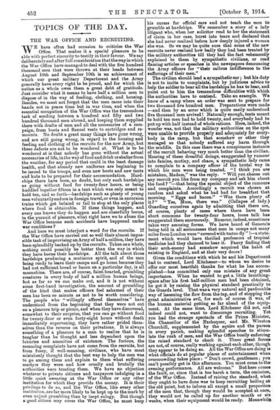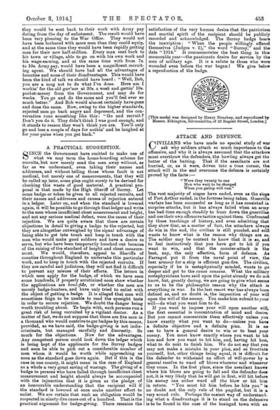TOPICS OF THE DAY.
THE WAR OFFICE AND RECRUITING.
WE have often had occasion to criticize the War Office. That makes it a special pleasure to be able with perfect sincerity to testify in their favour. We say deliberately and after full consideration that the way in which the War Office have managed to deal with the five hundred thousand men that were thrown at their heads between August 10th and September 10th is an achievement of which our great military Department and the Army generally have every right to be proud, and for which the nation as a whole owes them a great debt of gratitude. Just consider what it means to have half a million men to dispose of in the way of feeding, clothing, and housing. Besides, we must not forget that the men came into their hands not in peace time but in war time, and when the essential occupation of the War Office was the tremendous task of sending between a hundred and fifty and two hundred thousand men abroad, and keeping them supplied there with drafts of men and all the necessaries of a cam- paign, from boots and flannel vests to cartridges and re- mounts. No doubt a great many things have gone wrong, and are still going wrong, in regard to the housing and feeding and clothing of the recruits for the new Army, but these defects are not to be wondered at. What is to be wondered at is that nobody has gone without the actual necessaries of life, in the way of food and drink or shelter from the weather, for any period that could in the least damage health, and that already new uniforms are beginning to be issued to the troops, and even new boots and new tents and huts to be prepared for their accommodation. Hard- ships there have been, no doubt, but only such hardships as going without food for twenty-four hours, or being huddled together fifteen in a tent which was only meant to hold ten, and so forth—hardships such as plenty of young men voluntarily endure in foreign travel, or even in excursion trains which get belated or fail to stop at the only places where food is obtainable. If these things happen, and every one knows they do happen and are cheerfully borne, in the pursuit of pleasure, what right have we to abuse the War Office because such accidents have happened under war conditions ?
And here we must interject a word for the recruits. If the War Office have carried out so well their almost impos- sible task of improvising anArmy of half a million, they have been splendidly backed up by the recruits. Taken as a whole, nothing could possibly be better than the way in which they have borne their hardships. All the talk about those hardships producing a mutinous spirit, and of the men being ready to leave their camps and go home because they had not sufficient bread or bacon on a particular day, is all moonshine. There are, of course, faint-hearted, grumbling creatures in every body of half a million human beings, but as far as we can make out, and it is not without same first-hand investigation, the amount of grumbling of the kind that makes officers feel ashamed of their men has been so minute as not to be worth considering. The people who " willingly offered themselves" have understood from the beginning that they were not out on a pleasure trip or picnic, and when they have discovered, somewhat to their surprise, that you can go without food for twenty-four or even forty-eight hours without death immediately supervening, they have rather prided them- selves than the reverse on their privations. It is always something of a pleasure to a man to realize that he is tougher than he thought and less dependent upon the luiuries and amenities of existence. The furious, the menacing complaints have not come from the recruits, but from fussy, if well-meaning, civilians, who have most mistakenly thought that the best way to help the men was to go among them and explain to them what suffering martyrs they were and how cruelly and brutally the authorities were treating them. We have no objection whatever to private citizens and taxpayers indulging in a little quiet swearing at the War Office or any other institution for which they provide the money. It is their privilege to do so, and the War Office, like every other institution, are far more likely to be kept up to the mark by even unjust grumbling than by inept eulogy. But though a good citizen may curse the War Office, he must keep his curses for official ears and not teach the men to grumble at hardships. We remember a story of a lady litigant who, when her solicitor read to her the statement of claim in her case, burst into tears and declared that she had never realized before how deeply injured a woman she was. So we may be quite sure that some of the new recruits never realized how badly they had been treated by the military authorities till they had the fact vehemently explained to them by sympathetic civilians, or read flaming articles or speeches in the newspapers denouncing the Army officers for " their callous indifference to the sufferings of their men."
The civilian should lend a sympathetic ear ; but his duty is not to incite to complaints, but by judicious advice to help the soldier to bear all the hardships he has to bear, and point out to him the tremendous difficulties with which the authorities have to contend. Take an example. We know of a camp where an order was sent to prepare for two thousand five hundred men. Preparations were made —and then by an error which is quite easily understood five thousand men arrived ! Naturally enough, tents meant to hold ten men had to hold twenty, and everybody had to put up with half instead of whole rations. Here, indeed, the wonder was, not that the military authorities on the spot were unable to provide properly and adequately for every- body in the camp, but that somehow or other they managed so that nobody suffered any harm through the muddle. In this case there was a conspicuous instance of the recruit behaving very much better than the civilian. Hearing of these dreadful doings, exaggerated by rumour into famine, mutiny, and chaos, a sympathetic lady came to complain to a company officer of the brutal way in which his men were being treated. " I think you are mistaken, Madam," was the reply. " Will you choose out any recruit you like from my company and ask him about the food ? "—that being the special object of the rumours and complaints. Accordingly a recruit was chosen at random and asked what he had had for breakfast that morning. " Eggs and bacon." " Was there plenty of it ?" " Yes, Mum, there was." (Collapse of lady.) Guarding ourselves again by admitting that there are, of course, plenty of cases where there have been short commons for twenty-four hours, loose talk has exaggerated them enormously. Rumour, indeed, sometimes takes very amusing forms. r We have heard of Generals being told in all seriousness that men in camps not many miles fromLondon were "covered with tsetse-fly " !—a state- ment which would have thrilled professors of tropical medicine had they chanced to hear it. Fancy finding that their arch-enemy had somehow acquired the habit of existing in England, and at their very doors !
Given the conditions with which he and his Department had to contend, Lord Kitchener—to whom we desire to offer our most heartfelt thanks for what he has accom- plished—has committed. only one mistake of any great importance. When he wanted to get a little breathing- space after his first half-million men had been obtained, he got it by raising the physical standard practically to the Guards level. That was a very natural and pardonable way of lessening the flow from the tap, and of stopping the great administrative evil, for such of course it was, of the human material getting so far ahead of the equip- ment. At the same time, Lord Kitchener did not, and indeed could not, want to discourage recruiting. Yet you had the strange spectacle of the Prime Minister, the Chancellor of the Exchequer, and Mr. Winston Churchill, supplemented by the squire and the parson in every parish, making splendid speeches to stimu- late the rush of men, and the War Office busily enforcing the raised standard to check it. These great forces are not, of course, really working against each other, though they appear to be doing so. All the War Office are doing is what officials do at popular places of entertainment when overcrowding takes place : " Don't crowd, gentlemen ; you can't possibly get in this afternoon. You must come to the evening performance. All are welcome." But here comes the fault, or, since that is too harsh a term, the omission, of the War Office. Instead of raising the standard, what they ought to have done was to keep recruiting boiling at the old point, but to inform all except a small proportion of the men that, though they would be accepted at once, they would not be called up for another month or six weeks, when their equipment would be ready. Meanwhile.
they would be sent back to their work with Army pay dating from the day of enlistment. The result would have been very pleasing to the War Office. They would not have been bothered with more men than they could equip, and at the same time they would have been rapidly getting men for their new half-million. Every man sent back to his town or village, able to go on with his own work and his wage-earning, and at the same time with from 7s. to 10s. Army pay, would have been a magnificent recruit- ing agent. We should have had all the advantages of bounties and none of their disadvantages. This would have been the kind of talk we should have heard " Well, Bob, you are a mug not to do what I've done. Here am I workin' for the old guv'nor at 30s. a week and gettin' 10s. pocket-money from the Government, and may do for weeks. You go and do the same and you'll feel ever so much better." And Bob would almost certainly have gone and done the same. Now, owing to the higher standards, rejected men go back angry and depressed, and the con- versation runs something like this : " Go and recruit ? Don't you do it. They didn't think I was good enough, and it stands to reason they won't think you are. You'll only go and lose a couple of days for nothin' and be laughed at for your pains when you get back."











































 Previous page
Previous page